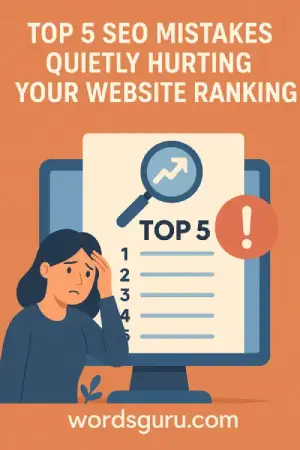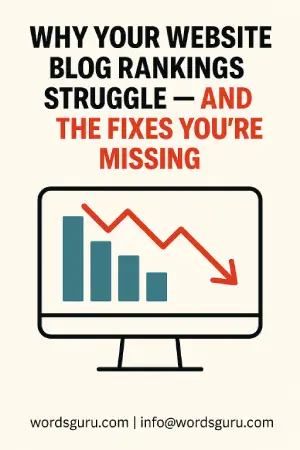Publishing a blog is easy. Getting it noticed by Google? That’s where most people get stuck. You can have a great blog post written, and if you don’t pull the right SEO levers, no one is going to see it. The blog will be buried under a pile of other competing content, hurting your website blog rankings. Ranking well isn’t about chasing algorithms; it’s about showcasing good quality content that both people and search engines can recognize and add value to. Let’s examine the basic reasons your blog isn’t ranking and what steps you can take to turn it around.
Top 5 SEO Mistakes Quietly Hurting Your Website Ranking

Here’s the rundown on the most frequent reasons and the specific fixes that will help you turn things around:
1. Chasing Keywords That Don’t Work for You
The problem: Many blogs fail because they are targeting keywords that are too generic or simply too difficult, making it hard to compete with established sites.
The solution:
- Instead of broad generic terms, try to find niche keywords.
- Use keyword research tools, such as Ahrefs, SEMrush, or Google Keyword Planner, to find keywords for better ranking.
- Put your primary keyword in the title, meta description, headings, and the content naturally (avoid keyword stuffing).
2. Blogs With No Direction (Poor Internal Linking)
The problem: A blog without internal links is like a road without signs—it doesn’t provide direction for the user and the search engine. If your blog does not link to other relevant pages on your site, search engines will see it as an orphaned page and give it little authority.
The solution:
- Link to relevant content on your site using descriptive anchor text, not just “click here.”
- Create topic clusters where the main hub page links to several related posts.
- Add links to your blog posts from the pages that get the most traffic, such as the homepage and service pages. This strengthens your SEO search engine ranking.
3. Not Showing Depth in Your Topic
The problem: Posting one article on a topic does not make you an authority. Search engines favor sites that cover a niche to show consistency and depth.
The solution:
- Create content groups to cover the main topic and its important subtopics in detail.
- Provide additional supporting information, such as guides, case studies, FAQs, etc. This builds trust and improves SEO ranking.
4. Letting Technical Glitches Hold Back Strong Content
The problem: Even the best blog post can lose ranking opportunities due to site loading times, poor navigability, and crawl errors that prevent search engines from properly indexing your content.
The solution:
- Run a site audit to find issues using Google Search Console or Screaming Frog.
- Compress images, minify code, and improve loading times.
- Make sure your site is mobile-friendly and adheres to Core Web Vitals benchmarks.
- Use canonical tags properly to avoid being penalized for duplicate content.
5. Missing Out on Featured Snippets and AI Search
The problem: Search is changing—AI-related overviews and even featured snippets are grabbing more attention. If your content does not have the same context as these search areas, you are losing significant visibility.
The solution:
- Structure your content with appropriate headings, bullet points, and summaries.
- Use schema markup, such as FAQ or How-to, as an option for strong snippets.
- Write in a natural question-answer style that matches the way users search online.
Quick Website Ranking Strategies That Deliver Fast Results
Are you eager to boost your website blog rankings even faster? These impactful recommendations can produce good results:
- Revise outdated information, fix broken links, and update content with new examples.
- Make sure your titles and descriptions use keywords and are interesting enough to entice clicks.
- Add internal links to pass authority to important webpages.
- Compress image files, use strong alt text, and load pages quickly.
- Use descriptive headings, bulleted lists, and short paragraphs.
- Check your webpage analytics routinely and make modifications according to your performance reports.
Final Words
Ranking your blog is not all about writing content; it is about visibility through planning and strategy! From keyword targeting, technical optimization, and attention to the audience’s needs, every detail matters. Once you fix these problems, you are not only improving your website blog rankings but also creating authority, generating ongoing traffic, and establishing yourself as a knowledgeable voice in your niche.
Are you looking to improve your content strategy and optimize for search engine ranking? At WordsGuru.com, we work with businesses, marketers, and agencies to develop content that doesn’t just appear in search but outranks, engages readers, and has measurable results.


Comments (2)
tadalafil 60mg September 15, 2025 at 5:11 pm
Woah! I’m really loving the template/theme of this site. It’s simple, yet effective.
A lot of times it’s challenging to get that “perfect balance” between usability and
visual appearance. I must say that you’ve done a
superb job with this. Also, the blog loads very quick for me on Chrome.
Superb Blog!
https://starda-mission.top September 19, 2025 at 8:45 pm
Thanks to my father who shared with me on the topic of this website, this weblog is truly amazing.